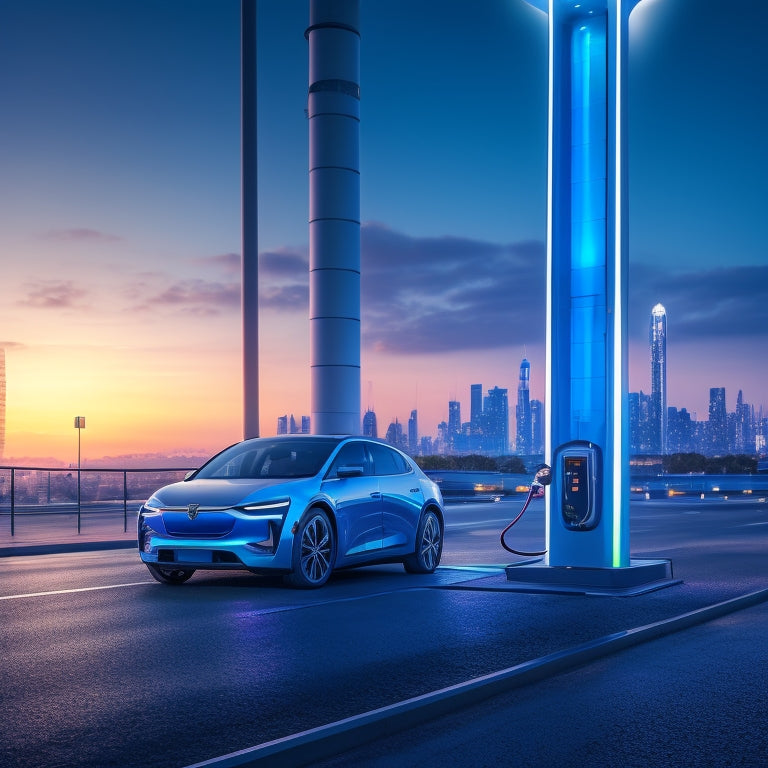
What Does EV Charging Station Installation Cost?
Share
You can anticipate paying between $300 to $1,500 or more for an EV charging station installation, depending on the type of charger, installation complexity, and other factors, with labor costs potentially accounting for up to 50% of the total cost. Your final cost will depend on the charger type, such as Level 1, Level 2, or DC Fast Charger, and the electrician's rates. Urban areas tend to have higher labor rates than rural areas. As you explore the various options, you'll want to evaluate equipment quality, smart charger capabilities, and maintenance costs to make an informed decision about your EV charging station installation.
Key Takeaways
• The average EV charging station installation cost ranges from $300 to $1,500 or more, depending on the type of charger and installation complexity.
• Labor costs can account for up to 50% of the total installation cost, varying based on electrician rates, location, and complexity.
• The type of charger needed, such as Level 1, Level 2, or DC Fast Charger, significantly affects the overall installation cost.
• Site preparation, including evaluating electrical infrastructure and obtaining necessary permits, is a crucial factor in determining the total installation cost.
• Additional costs, including network and connectivity expenses, permits, and ongoing maintenance, should be considered when calculating the total installation cost.
Average EV Charging Station Cost
When you're planning to install an EV charging station, one of the key factors to keep in mind is the average cost, which can range from $300 to $1,500 or more, depending on the type and features of the charging station.
As you explore your options, you'll want to take into account the various EV incentives that may be available to you, such as federal tax credits or state-specific rebates. These incentives can help offset the upfront cost of the charging station, making it more affordable for you to install.
Additionally, it's crucial to factor in the charging etiquette of your household, including who'll be using the charger and when. Will it be a Level 1, Level 2, or DC Fast Charger? Will you need a smart charger that can monitor and control energy usage?
Installation Labor Cost Factors
It's crucial to consider the average cost of the EV charging station. You'll also need to factor in the installation labor cost, which can add up to 50% of the total cost, depending on the complexity of the installation and the electrician's rates. The labor cost will vary depending on your location, with urban areas typically having higher rates than rural areas. You'll want to research local electricians or companies specializing in EV charging station installations to get an accurate estimate.
Experienced technicians with certifications in electrical work will likely charge more than less-experienced ones. Additionally, if you live in an area with strong local unions, you may need to factor in union rates, which can be higher than non-union rates. It's crucial to get quotes from multiple licensed electricians to compare rates and find the best fit for your installation. Be sure to ask about their experience with EV charging station installations and any relevant certifications they may hold.
Electric Vehicle Charger Types
As you explore the world of EV charging, you'll encounter various charger types that cater to different needs and applications.
You'll find that Level 1 chargers are suitable for everyday use, while home charging stations offer convenience and flexibility.
When you need a quick top-up, DC Fast Charging stations can replenish your battery to 80% in under 30 minutes, making them ideal for long road trips.
Level 1 Chargers
You plug your electric vehicle into a Level 1 charger, also known as a 120-volt charger, which uses a standard household outlet to replenish your vehicle's battery at a rate of about 2-5 miles of range per hour of charging. This is the most basic and convenient way to charge your EV, as it doesn't require any special installation or equipment beyond a dedicated 120-volt outlet. However, it's important to take a few things into account before plugging in.
| Wiring Considerations | Outlet Upgrades | Installation Cost |
|---|---|---|
| 14-gauge wire recommended | Dedicated 20-amp outlet | $0 - $100 |
| 12-gauge wire for longer runs | Upgraded 20-amp circuit | $100 - $300 |
| Consult an electrician for complex wiring | Additional outlet installation | $300 - $500 |
Keep in mind that Level 1 charging may not be suitable for daily driving, as it can take 24 hours to fully charge a depleted battery. Additionally, you may need to upgrade your electrical panel or wiring to support the increased power draw. It's important to consult with a licensed electrician to make sure a safe and efficient installation.
Home Charging Stations
Home charging stations, also referred to as Electric Vehicle Supply Equipment (EVSE), are specifically designed to recharge your electric vehicle's battery at a faster rate than Level 1 chargers. These stations can be installed in your garage, providing a convenient and efficient way to charge your vehicle.
With a home charging station, you can expect to replenish your battery to 80% in just a few hours.
When choosing a home charging station, consider a smart charger that integrates seamlessly with your smart home system. This allows you to monitor and control your charging sessions remotely, ensuring you're always ready to hit the road.
Moreover, a well-organized garage with a dedicated charging station can enhance your overall garage organization. Imagine pulling into your garage, plugging in your vehicle, and letting the charger do its magic while you unwind after a long day.
With a home charging station, you'll enjoy the convenience, speed, and flexibility you need to make the most of your electric vehicle.
DC Fast Charging
DC Fast Charging stations, capable of replenishing your electric vehicle's battery to 80% in under 30 minutes, are the fastest type of electric vehicle charger available. These high-power chargers utilize DC Power, which enables rapid replenishment of your vehicle's battery.
You'll often find DC Fast Charging stations along highways and in urban areas, as they're designed to provide a quick top-up when you're on-the-go. Fast Networks, like Electrify America or EVgo, operate extensive networks of DC Fast Charging stations, providing you with a convenient and reliable way to recharge your vehicle.
When using a DC Fast Charger, you'll typically need to plug in your vehicle using a Combined Charging System (CCS) connector, which is designed specifically for high-power DC Fast Charging. With a DC Fast Charger, you can expect to add around 60-100 miles of range in just 20-30 minutes, making them an ideal choice for long road trips or when you're in a hurry.
Residential Vs Commercial Install
As you consider installing an EV charging station, you'll need to decide between a residential or commercial setup, each with its unique requirements and costs.
You'll need to factor in the cost of equipment, labor, and permits, as well as site preparation needs, which can vary considerably depending on the type of installation.
Cost of Equipment
Your equipment costs for EV charging station installation vary greatly depending on whether you're opting for a residential or commercial setup. The type and quality of equipment you choose will have a substantial impact on your overall costs.
| Residential | Commercial |
|---|---|
| Level 2 (240V) charger: $500-$1,000 | DC Fast Charger: $5,000-$10,000 |
| 240V charging cable: $100-$300 | Networked charger: $2,000-$5,000 |
| Wall-mounted charger: $300-$600 | Pedestal-mounted charger: $1,000-$2,000 |
| Smart charger with Wi-Fi: $400-$800 | High-power charger (50 kW): $10,000-$20,000 |
| Basic charger with minimal features: $200-$400 | Advanced charger with energy management: $5,000-$10,000 |
When selecting equipment, prioritize equipment quality and energy efficiency. A high-quality charger with advanced features like Wi-Fi connectivity, smart charging, and energy monitoring may cost more upfront but can lead to long-term savings and a better user experience. Be sure to research and compare different options to find the best fit for your needs and budget.
Labor and Permits
You'll need to factor in labor costs and permits, which can add a significant amount to your overall EV charging station installation cost, with residential and commercial installations having different requirements and expenses.
When it comes to labor costs, commercial installations typically require more extensive work, including running conduit and wiring, which increases the labor cost. Additionally, commercial installations may be subject to Union contracts, which can impact labor costs. On the other hand, residential installations are generally less complex and require less labor.
Here are some key factors to take into account:
-
Permitting fees: These vary by location, but you can expect to pay between $500 to $2,000, depending on your location and the type of installation.
-
Labor rates: Commercial installations may require specialized electricians, which can increase labor rates. You can expect to pay between $75 to $200 per hour.
-
Municipal regulations: Make sure you comply with local regulations, which may require additional inspections and fees.
Site Preparation Needs
Prior to installing an EV charging station, it's important to evaluate the site preparation needs, which vary greatly between residential and commercial installations. Factors like existing electrical infrastructure, parking lot layouts, and building codes can influence the requirements.
As you plan your EV charging station installation, you'll need to take into account the unique demands of your site. For residential installations, you'll typically need to confirm that your electrical panel can support the increased power load, and that you have sufficient ground clearance for the charging station.
In contrast, commercial installations often require more extensive site preparation. This includes soil assessment to ensure that the charging station's foundation can support the weight of the equipment. You may also need to adjust your parking lot layout to accommodate the charging station and ensure that it's easily accessible to users.
Permits and Inspection Fees
Obtaining necessary permits and passing inspections can add significant costs to your EV charging station installation, with fees ranging from a few hundred to several thousand dollars depending on your location and local regulations.
As you navigate the permitting process, you'll need to take into account the following:
-
Municipal regulations: Your local government may have specific rules and regulations governing EV charging station installations. You'll need to obtain permits that comply with these regulations, which can add to your overall cost.
-
Zoning requirements: Depending on where you're installing your EV charging station, you may need to obtain zoning permits or variances. This is especially true if you're installing a public charging station or one that's visible from the street.
-
Inspection fees: Once your installation is complete, you'll need to pass inspections to make sure your charging station meets local electrical and safety codes. Inspection fees can range from a few hundred to several thousand dollars, depending on the complexity of the inspection.
Network and Connectivity Costs
As you set up your EV charging station, integrating it with a network and guaranteeing seamless connectivity will necessitate additional investments, including the cost of networking hardware, software, and subscription fees. You'll need to take into account the cost of cellular plans, which can range from $5 to $50 per month, depending on your data requirements.
If you opt for a Wi-Fi connection, you'll need to factor in the cost of Wi-Fi routers, which can range from $50 to $200. You'll also need to invest in networking software, which can cost anywhere from $100 to $500, depending on the complexity of your network.
Moreover, you may need to pay subscription fees for cloud-based services, which can range from $10 to $50 per month. It's crucial to carefully evaluate your networking needs to make sure you're not overspending on unnecessary features.
Ongoing Maintenance Expenses
You'll need to factor in ongoing maintenance expenses to guarantee your EV charging station remains operational and efficient, including regular software updates, hardware inspections, and potential repairs that can cost between $500 to $2,000 per year, depending on the complexity of your setup.
To keep your station running smoothly, you'll want to prioritize routine inspections and preventive measures.
Here are some essential maintenance tasks to budget for:
-
Software updates: Regularly update your charging station's software to maintain compatibility with evolving EV models and to address security vulnerabilities.
-
Hardware inspections: Perform routine checks on cables, connectors, and charging points to identify potential issues before they become major problems.
-
Electrical system checks: Verify that your station's electrical system is functioning correctly, and make any necessary adjustments to prevent overheating or electrical faults.
Frequently Asked Questions
Can I Install an EV Charging Station Myself to Save Money?
As you ponder taking the DIY route, a spark of caution flickers, warning you of DIY Dilemmas and Safety Concerns lurking in the shadows, threatening to electrocute your savings and your safety.
Are EV Charging Stations Compatible With All Electric Vehicles?
You'll be relieved to know that most modern EV charging stations boast vehicle agnosticism, ensuring universal compatibility with various electric vehicles, so you can charge your ride with confidence, regardless of the make or model.
Will My Home's Electrical System Support EV Charging Station Installation?
"Can you imagine returning home to a drained EV battery? You'll need to assess your home's circuit capacity to determine if it can support the added load of EV charging; electrical upgrades might be necessary to avoid overloading your system."
Can I Claim Tax Credits or Incentives for EV Charging Station Installation?
You can claim Federal Incentives, State Rebates, and Local Perks for your EV charging station installation, which can greatly offset the cost; check government websites for specific Government Benefits that apply to your situation.
Do EV Charging Stations Require Regular Software Updates?
You'll need to guarantee that your EV charging station receives regular software updates to maintain peak performance and security, as outdated systems can compromise cybersecurity protocols; remote monitoring helps facilitate seamless updates and alerts you to potential issues.
Related Posts
-

5 Tips for Efficient Last Mile EV Delivery
You're looking to supercharge your last mile EV delivery operations. Start by optimizing your fleet operations to red...
-

Understanding Residential Solar Panel Installation Warranties
When you invest in a residential solar panel installation, you expect a comprehensive warranty package that covers th...
-

Boosting Motorcycle Performance With High-Torque Upgrades
You're seeking to maximize your motorcycle's full potential with high-torque upgrades. By swapping to a high-torque m...


